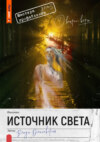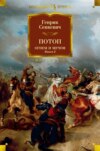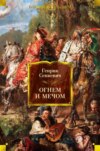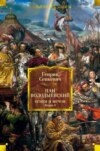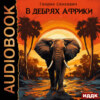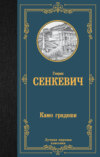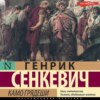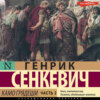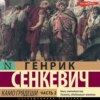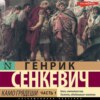Loe raamatut: «The Knights of the Cross, or, Krzyzacy»
To the Reader
Here you have, gentle reader – old writers always called you gentle – something very much more than a novel to amuse an idle hour. To read it will be enjoyable pastime, no doubt; but the brilliant romance of the brilliant author calls upon you for some exercise of the finest sympathy and intelligence; sympathy for a glorious nation which, with only one exception, has suffered beyond all other nations; intelligence, of the sources of that unspeakable and immeasurable love and of the great things that may yet befall before those woes are atoned for and due punishment for them meted out to their guilty authors.
Poland! Poland! The very name carries with it sighings and groanings, nation-murder, brilliance, beauty, patriotism, splendors, self-sacrifice through generations of gallant men and exquisite women; indomitable endurance of bands of noble people carrying through world-wide exile the sacred fire of wrath against the oppressor, and uttering in every clime a cry of appeal to Humanity to rescue Poland.
It was indeed a terrible moment in history, when the three military monarchies of Europe, Russia, Austria and Prussia, swooped down upon the glorious but unhappy country, torn by internal trouble, and determined to kill it and divide up its dominions. All were alike guilty, as far as motive went. But Holy Russia – Holy! – since that horrible time has taken upon herself by far the greatest burden of political crime in her dealings with that noble nation. Every evil passion bred of despotism, of theological hatred, of rancorous ancient enmities, and the ghastliest official corruption, have combined in Russian action for more than one hundred and fifty years, to turn Poland into a hell on earth. Her very language was proscribed.
This is not the place to give details of that unhappy country's woes. But suffice it to say, that Poland, in spite of fatuous prohibitions, has had a great literature since the loss of her independence, and that literature has so kept alive the soul of the nation, that with justice Poland sings her great patriotic song:
"Poland is not yet lost
As long as we live…"
The nation is still alive in its writers and their works, their splendid poetry and prose.
It is a pity that so few of these great writers are widely known. But most people have heard of Jan Kochanowski, of Mikolaj Rey, of Rubinski, of Szymanowicz, of Poland's great genius in this century, one of the supreme poets of the world, Adam Mickiewicz, of Joseph Ignac, of Kraszewski, who is as prolific in literary and scientific works as Alexander von Humboldt, and of hundreds of others in all branches of science and art, too numerous to mention here.
And it is remarkable that the author of this book, Henryk Sienkiewicz, should of late have attained such prominence in the public eye and found a place in the heart of mankind. It is of good omen. Thus, Poland, in spite of her fetters, is keeping step in the very van of the most progressive nations.
The romance of Sienkiewicz in this volume is perhaps the most interesting and fascinating he has yet produced. It is in the very first rank of imaginative and historical romance. The time and scene of the noble story are laid in the middle ages during the conquest of Pagan Lithuania by the military and priestly order of the "Krzyzacy" Knights of the Cross. And the story exhibits with splendid force the collision of race passions and fierce, violent individualities which accompanied that struggle. Those who read it will, in addition to their thrilling interest in the tragical and varied incidents, gain no little insight into the origin and working of the inextinguishable race hatred between Teuton and Slav. It was an unfortunate thing surely, that the conversion of the heathen Lithuanians and Zmudzians was committed so largely to that curious variety of the missionary, the armed knight, banded in brotherhood, sacred and military. To say the least, his sword was a weapon dangerous to his evangelizing purpose. He was always in doubt whether to present to the heathen the one end of it, as a cross for adoration, or the other, as a point to kill with. And so, if Poland was made a Catholic nation, she was also made an undying and unalterable hater of the German, the Teutonic name and person.
And so this noble, historical tale, surpassed perhaps by none in literature, is commended to the thoughtful attention and appreciation of the reader.
SAMUEL A. BINION.
NEW YORK, May 9, 1899.
PART FIRST
CHAPTER I
In Tyniec,[1] in the inn under "Dreadful Urus," which belonged to the abbey, a few people were sitting, listening to the talk of a military man who had come from afar, and was telling them of the adventures which he had experienced during the war and his journey.
He had a large beard but he was not yet old, and he was almost gigantic but thin, with broad shoulders; he wore his hair in a net ornamented with beads; he was dressed in a leather jacket, which was marked by the cuirass, and he wore a belt composed of brass buckles; in the belt he had a knife in a horn scabbard, and at his side a short traveling sword.
Near by him at the table, was sitting a youth with long hair and joyful look, evidently his comrade, or perhaps a shield-bearer, because he also was dressed as for a journey in a similar leather jacket. The rest of the company was composed of two noblemen from the vicinity of Krakow and of three townsmen with red folding caps, the thin tops of which were hanging down their sides to their elbows.
The host, a German, dressed in a faded cowl with large, white collar, was pouring beer for them from a bucket into earthen mugs, and in the meanwhile he was listening with great curiosity to the military adventures.
The burghers were listening with still greater curiosity. In these times, the hatred, which during the time of King Lokietek had separated the city and the knighthood, had been very much quenched, and the burghers were prouder than in the following centuries. They called them still des allerdurchluchtigsten Kuniges und Herren and they appreciated their readiness ad concessionem pecuniarum; therefore one would very often see in the inns, the merchants drinking with the noblemen like brothers. They were even welcome, because having plenty of money, usually they paid for those who had coats of arms.
Therefore they were sitting there and talking, from time to time winking at the host to fill up the mugs.
"Noble knight, you have seen a good piece of the world!" said one of the merchants.
"Not many of those who are now coming to Krakow from all parts, have seen as much," answered the knight.
"There will be plenty of them," said the merchant. "There is to be a great feast and great pleasure for the king and the queen! The king has ordered the queen's chamber to be upholstered with golden brocade, embroidered with pearls, and a canopy of the same material over her. There will be such entertainments and tournaments, as the world has never seen before."
"Uncle Gamroth, don't interrupt the knight," said the second merchant.
"Friend Eyertreter, I am not interrupting; only I think that he also will be glad to know about what they are talking, because I am sure he is going to Krakow. We cannot return to the city to-day at any rate, because they will shut the gates."
"And you speak twenty words, in reply to one. You are growing old, Uncle Gamroth!"
"But I can carry a whole piece of wet broadcloth just the same."
"Great thing! the cloth through which one can see, as through a sieve."
But further dispute was stopped by the knight, who said:
"Yes, I will stay in Krakow because I have heard about the tournaments and I will be glad to try my strength in the lists during the combats; and this youth, my nephew, who although young and smooth faced, has already seen many cuirasses on the ground, will also enter the lists."
The guests glanced at the youth who laughed mirthfully, and putting his long hair behind his ears, placed the mug of beer to his mouth.
The older knight added:
"Even if we would like to return, we have no place to go."
"How is that?" asked one of the nobles.
"Where are you from, and what do they call you?"
"I am Macko of Bogdaniec, and this lad, the son of my brother, calls himself Zbyszko. Our coat of arms is Tempa Podkowa, and our war-cry is Grady!"
"Where is Bogdaniec?"
"Bah! better ask, lord brother, where it was, because it is no more. During the war between Grzymalczyks and Nalenczs,[2] Bogdaniec was burned, and we were robbed of everything; the servants ran away. Only the bare soil remained, because even the farmers who were in the neighborhood, fled into the forests. The father of this lad, rebuilt; but the next year, a flood took everything. Then my brother died, and after his death I remained with the orphan. Then I thought: 'I can't stay!' I heard about the war for which Jasko of Olesnica, whom the king, Wladyslaw, sent to Wilno after he sent Mikolaj of Moskorzowo, was collecting soldiers. I knew a worthy abbot, Janko of Tulcza, to whom I gave my land as security for the money I needed to buy armor and horses, necessary for a war expedition. The boy, twelve years old, I put on a young horse and we went to Jasko of Olesnica."
"With the youth?"
"He was not even a youth then, but he has been strong since childhood. When he was twelve, he used to rest a crossbow on the ground, press it against his chest and turn the crank. None of the Englishmen, whom I have seen in Wilno, could do better."
"Was he so strong?"
"He used to carry my helmet, and when he passed thirteen winters, he could carry my spear also."
"You had plenty of fighting there!"
"Because of Witold. The prince was with the Knights of the Cross, and every year they used to make an expedition against Lithuania, as far as Wilno. Different people went with them: Germans, Frenchmen, Englishmen, who are the best bowmen, Czechs, Swiss and Burgundians. They cut down the forests, burned the castles on their way and finally they devastated Lithuania with fire and sword so badly, that the people who were living in that country, wanted to leave it and search for another land, even to the end of the world, even among Belial's children, only far from the Germans."
"We heard here, that the Lithuanians wanted to go away with their wives and children, but we did not believe it."
"And I looked at it. Hej! If not for Mikolaj of Moskorzowo, for Jasko of Olesnica, and without any boasting, if not for us, there would be no Wilno now."
"We know. You did not surrender the castle."
"We did not. And now notice what I am going to say, because I have experience in military matters. The old people used to say: 'furious Litwa'[3] – and it's true! They fight well, but they cannot withstand the knights in the field. When the horses of the Germans are sunk in the marshes, or when there is a thick forest – that's different."
"The Germans are good soldiers!" exclaimed the burghers.
"They stay like a wall, man beside man, in their iron armor. They advance in one compact body. They strike, and the Litwa are scattered like sand, or throw themselves flat on the ground and are trampled down. There are not only Germans among them, because men of all nations serve with the Knights of the Cross. And they are brave! Often before a battle a knight stoops, stretches his lance, and rushes alone against the whole army."
"Christ!" exclaimed Gamroth. "And who among them are the best soldiers?"
"It depends. With the crossbow, the best is the Englishman, who can pierce a suit of armor through and through, and at a hundred steps he will not miss a dove. Czechowie (Bohemians) cut dreadfully with axes. For the big two-handed sword the German is the best. The Swiss is glad to strike the helmets with an iron flail, but the greatest knights are those who come from France. These will fight on horseback and on foot, and in the meanwhile they will speak very brave words, which however you will not understand, because it is such a strange language. They are pious people. They criticise us through the Germans. They say we are defending the heathen and the Turks against the cross, and they want to prove it by a knightly duel. And such God's judgment is going to be held between four knights from their side, and four from our side, and they are going to fight at the the court of Waclaw, the Roman and Bohemian king."[4]
Here the curiosity so increased among the noblemen and merchants, that they stretched their necks in the direction of Macko of Bogdaniec and they asked:
"And who are the knights from our side? Speak quickly!" Macko raised the mug to his mouth, drank and then answered:
"Ej, don't be afraid about them. There is Jan of Wloszczowa, castellan of Dobrzyn; there's Mikolaj of Waszmuntow; there are Jasko of Zdakow and Jarosz of Czechow: all glorious knights and sturdy fellows. No matter which weapons they choose, – swords or axes – nothing new to them! It will be worth while for human eyes to see it and for human ears to hear it – because, as I said, even if you press the throat of a Frenchman with your foot, he will still reply with knightly words. Therefore so help me God and Holy Cross they will outtalk us, but our knights will defeat them."
"That will be glory, if God will bless us," said one of the nobles.
"And Saint Stanislaw!" added another. Then turning toward Macko, he asked him further:
"Well! tell us some more! You praised the Germans and other knights because they are valiant and have conquered Litwa easily. Did they not have harder work with you? Did they go against you readily? How did it happen? Praise our knights."
But evidently Macko of Bogdaniec was not a braggart, because he answered modestly:
"Those who had just returned from foreign lands, attacked us readily; but after they tried once or twice, they attacked us with less assurance, because our people are hardened and they reproached us for that hardness: 'You despise,' they used to say,'death, but you help the Saracens, and you will be damned for it.' And with us the deadly grudge increased, because their taunt is not true! The king and the queen have christened Litwa and everyone there tries to worship the Lord Christ although not everyone knows how. And it is known also, that our gracious lord, when in the cathedral of Plock they threw down the devil, ordered them to put a candle before him – and the priests were obliged to tell him that he ought not to do it. No wonder then about an ordinary man! Therefore many of them say to themselves:
"'The kniaz[5] ordered us to be baptized, therefore I was baptized; he ordered us to bow before the Christ, and I bowed; but why should I grudge a little piece of cheese to the old heathen devils, or why should I not throw them some turnips; why should I not pour the foam off of the beer? If I do not do it, then my horses will die; or my cows will be sick, or their milk will turn into blood – or there will be some trouble with the harvest.' And many of them do this, and they are suspected. But they are doing it because of their ignorance and their fear of the devils. Those devils were better off in times of yore. They used to have their own groves and they used to take the horses which they rode for their tithe. But to-day, the groves are cut down and they have nothing to eat – in the cities the bells ring, therefore the devils are hiding in the thickest forest, and they howl there from loneliness. If a Litwin[6] goes to the forest, then they pull him by his sheep-skin overcoat and they say: 'Give!' Some of them give, but there are also courageous boys, who will not give and then the devils catch them. One of the boys put some beans in an ox bladder and immediately three hundred devils entered there. And he stuffed the bladder with a service-tree peg, brought them to Wilno and sold them to the Franciscan priests, who gave him twenty skojcow[7] he did this to destroy the enemies of Christ's name. I have seen that bladder with my own eyes; a dreadful stench came from it, because in that way those dirty spirits manifested their fear before holy water."
"And who counted them, that you know there were three hundred devils," asked the merchant Gamroth, intelligently.
"The Litwin counted them, when he saw them entering the bladder. It was evident that they were there, because one would know it from the stench, and nobody wished to take out the peg to count them."
"What wonders, what wonders!" exclaimed one of the nobles.
"I have seen many great wonders, because everything is peculiar among them. They are shaggy and hardly any kniaz combs his hair; they live on baked turnips, which they prefer to any other food, because they say that bravery comes from eating them. They live in the forests with their cattle and snakes; they are not abstinent in eating nor drinking. They despise the married women, but greatly respect the girls to whom they attribute great power. They say that if a girl rubs a man with dried leaves, it will stop colic."
"It's worth while to have colic, if the women are beautiful!" exclaimed Uncle Eyertreter.
"Ask Zbyszko about it," answered Macko of Bogdaniec.
Zbyszko laughed so heartily that the bench began to shake beneath him.
"There are some beautiful ones," he said. "Ryngalla was charming."
"Who is Ryngalla? Quick!"
"What? you haven't heard about Ryngalla?" asked Macko.
"We have not heard a word."
"She was Witold's sister, and the wife of Henryk, Prince Mazowiecki."
"You don't say! Which Prince Henryk? There was only one Prince Mazowiecki, elect[8] of Plock, but he died."
"The same one. He expected a dispensation from Rome, but death gave him his dispensation, because evidently he had not pleased God by his action. Jasko of Olesnica sent me with a letter to Prince Witold, when Prince Henryk, elect of Plock, was sent by the king to Ryterswerder. At that time, Witold was tired of the war, because he could not capture Wilno, and our king was tired of his own brothers and their dissipation. The king having noticed that Witold was shrewder and more intelligent than his own brothers, sent the bishop to him, to persuade him to leave the Knights of the Cross, and return to his allegiance, for which he promised to make him ruler over Litwa. Witold, always fond of changing, listened with pleasure to the embassy. There were also a feast and tournaments. The elect mounted a horse, although the other bishops did not approve of it, and in the lists he showed his knightly strength. All the princes of Mazowsze are very strong; it is well known, that even the girls of that blood can easily break horseshoes. In the beginning the prince threw three knights from their saddles; the second time he threw five of them. He threw me from my saddle, and in the beginning of the encounter, Zbyszko's horse reared and he was thrown. The prince took all the prizes from the hands of the beautiful Ryngalla, before whom he kneeled in full armor. They fell so much in love with each other, that dining the feasts, the clerici[9] pulled him from her by his sleeves and her brother, Witold, restrained her. The prince said: 'I will give myself a dispensation, and the pope, if not the one in Home, then the one in Avignon, will confirm it, but I must marry her immediately – otherwise I will burn up!' It was a great offence against God, but Witold did not dare to oppose him, because he did not want to displease the embassador – and so there was a wedding. Then they went to Suraz, and afterward to Sluck, to the great sorrow of this youth, Zbyszko, who, according to the German custom, had selected the Princess Ryngalla to be the lady of his heart and had promised her eternal fidelity."
"Bah!" suddenly interrupted Zbyszko, "it's true. But afterward the people said that Ryngalla regretted being the wife of the elect (because he, although married, did not want to renounce his spiritual dignity) and feeling that God's blessing could not be over such a marriage, poisoned her husband. When I heard that, I asked a pious hermit, living not far from Lublin, to absolve me from that vow."
"He was a hermit," answered Macko, laughing, "but was he pious? I don't know; we went to him on Friday, and he was splitting bear's bones with an axe, and sucking the marrow so hard, that there was music in his throat."
"But he said that the marrow was not meat, and besides he had received permission to do it, because after sucking marrow, he used to have marvelous visions during his sleep and the next day he could prophesy until noontime."
"Well, well!" answered Macko. "And the beautiful Ryngalla is a widow and she may call you to her service."
"It would be in vain, because I am going to choose another lady, whom I will serve till death, and then I will find a wife."
"You must first find the girdle of a knight."
"Owa![10] There will be plenty of tournaments. And before that the king will not dub a single knight. I can measure myself against any. The prince could not have thrown me down, if my horse had not reared."
"There will be knights here better than you are."
Here the noblemen began to shout:
"For heaven's sake! Here, in the presence of the queen, will fight not such as you, but only the most famous knights in the world. Here will fight Zawisza of Garbow and Farurej, Dobko of Olesnica, Powala of Taczew, Paszko Zlodzie of Biskupice, Jasko Naszan and Abdank of Gora. Andrzej of Brochocice, Krystyn of Ostrow, and Jakob of Kobylany! Can you measure your sword against the swords of those, with whom neither the knights here, nor of the Bohemian court, nor of the Hungarian court can compete? What are you talking about? Are you better then they? How old are you?"
"Eighteen," answered Zbyszko.
"Everyone of them could crush you between his fingers."
"We will see."
But Macko said:
"I have heard that the king rewarded those knights munificently who returned from the Lithuanian war. Speak, you belong here; is it true?"
"Yes, it is true!" answered one of the nobles. "The king's munificence is known to the world; but it will be difficult to get near him now, because the guests are swarming to Krakow; they are coming to be in time for the queen's confinement and for the christening, wishing to show reverence to our lord and to render him homage. The king of Hungary is coming; they say the Roman emperor will be here also, and plenty of princes, counts and knights, will come because not one of them expects to return with empty hands. They even say that Pope Boniface, himself will arrive, because he also needs favor and help from our lord against his adversary in Avignon. Therefore in such a crowd, it will be difficult to approach the king; but if one would be able to see him and bow at his feet, then he will liberally reward him who deserves it."
"Then I will bow before him, because I have served enough, and if there is another war, I shall go again. We have taken some booty, and we are not poor; but I am getting old, and when one is old, and the strength has left his bones, one is pleased to have a quiet corner."
"The king was glad to see those who returned from Litwa with Jasko of Olesnica; and they feast well now."
"You see I did not return at that time; I was still at the war. You know that the Germans have suffered because of that reconciliation between the king and Kniaz Witold. The prince cunningly got the hostages back, and then rushed against the Germans! He ruined and burned the castle and slaughtered the knights and a great many of the people. The Germans wanted revenge, as did also Swidrygello, who went to them. There was again a great expedition started. The grand master Kondrat himself went with a great army; they besieged Wilno, and tried from their towers to ruin the castles; they also tried to capture the city by treachery – but they did not succeed! While retreating there were so many killed, that even half of them did not escape. Then we attacked Ulrich von Jungingen, the grand master's brother, who is bailiff in Swabja. But the bailiff was afraid of the kniaz and ran away. On account of this flight there is peace, and they are rebuilding the city. One pious monk, who could walk with bare feet on hot iron, has prophesied since that time, that as long as the world exists, no German soldier will be seen under the walls of Wilno. And if that be so, then whose hands have done it?"
Having said this, Macko of Bogdaniec, extended his palms, broad and enormous; the others began to nod and to approve:
"Yes, yes! It's true what he says! Yes!"
But further conversation was interrupted by a noise entering through the windows from which the bladders had been taken out, because the night was warm and clear. From afar thrumming, singing, laughing and the snorting of horses were heard. They were surprised because it was quite late. The host rushed to the yard of the inn, but before the guests were able to drink their beer to the last drop, he returned shouting:
"Some court is coming!"
A moment afterward, in the door appeared a footman dressed in a blue jacket and wearing a red folding cap. He stopped, glanced at the guests, and then having perceived the host, he said:
"Wipe the tables and prepare lights; the princess, Anna Danuta, will stop here to-night."
Having said this, he withdrew. In the inn a great commotion began; the host called his servants, and the guests looked at one another with great surprise.
"Princess Anna Danuta," said one of the townsmen, "she is Kiejstutowna,[11] Janusz Mazowiecki's wife. She was in Krakow two weeks, but she went to Zator to visit Prince Waclaw, and now she is coming back."
"Uncle Gamroth," said the other townsman, "let us go to the barn and sleep on the hay; the company is too high for us."
"I don't wonder they are traveling during the night," said Macko, "because the days are very warm; but why do they come to the inn when the monastery is so near?"
Here he turned toward Zbyszko:
"The beautiful Ryngalla's own sister; do you understand?"
And Zbyszko answered:
"There must be many Mazovian ladies with her, hej!"










